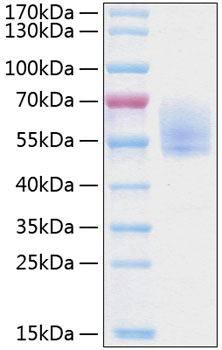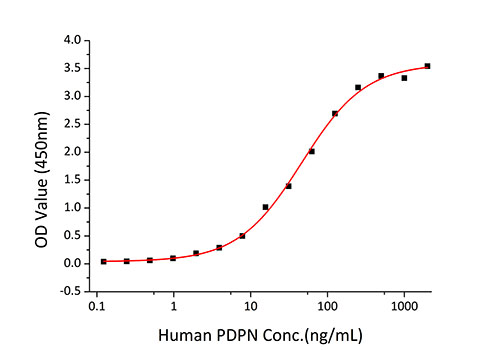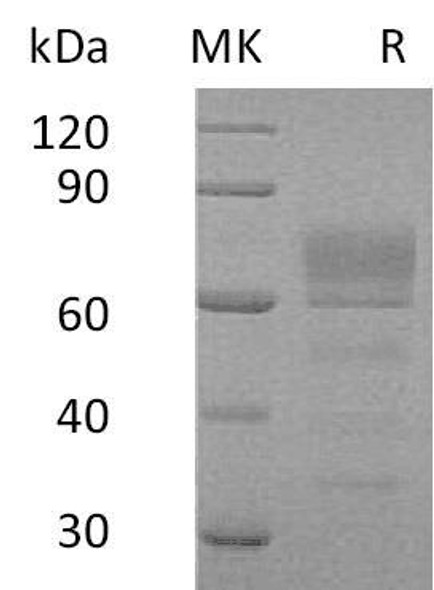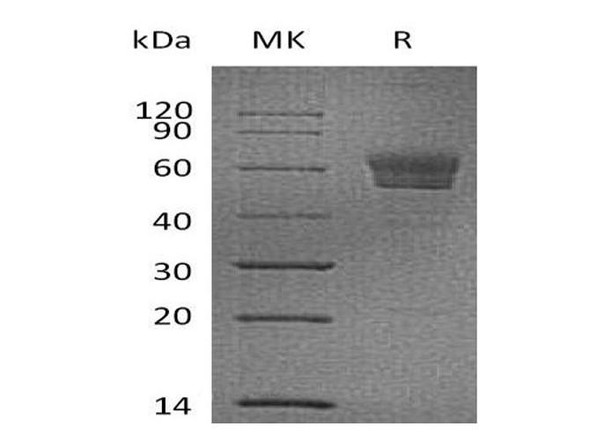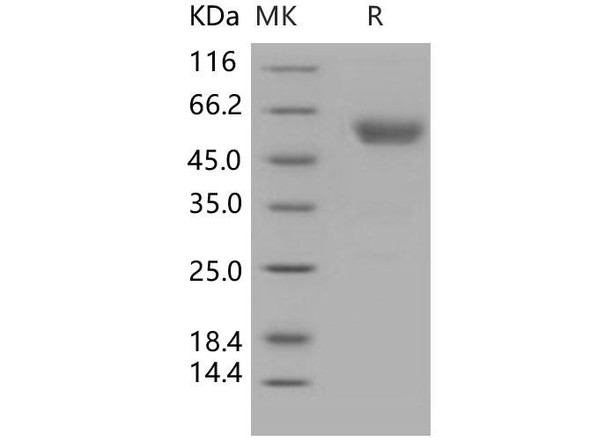Description
Recombinant Human Podoplanin/PDPN Protein
The Recombinant Human Podoplanin/PDPN Protein is a biologically active recombinant protein that plays a significant role in various cellular processes and signaling pathways in human biology. This protein is widely employed in immunological research, cell biology studies, protein-protein interaction analyses, and therapeutic development, providing researchers with a reliable tool for investigating Podoplanin/PDPN function and its implications in health and disease.
This product (SKU: RPCB0416) is produced using HEK293 cells and features a C-hFc&His tag for convenient detection and purification. The protein exhibits a calculated molecular weight of 37.31 kDa with an observed molecular weight of 50-65 kDa under denaturing conditions, achieving ≥ 95 % as determined by SDS-PAGE.. Functional bioactivity has been validated through rigorous quality control assays, confirming its suitability for demanding research applications.
Key Features
| High Purity by Affinity Chromatography | |
| Mammalian & Bacterial Expression Systems | |
| High lot-to-lot consistency via strict QC |
| Product Name: | Recombinant Human Podoplanin/PDPN Protein |
| SKU: | RPCB0416 |
| Size: | 10 μg , 20 μg , 50 μg , 100 μg |
| Reactivity: | Human |
| Synonyms: | AGGRUS, GP36, GP40, Gp38, HT1A-1, OTS8, PA2.26, T1A, T1A-2, T1A2, TI1A, PDPN, AGGRUS, podoplanin, GP36, GP40, Gp38, HT1A-1, OTS8, PA2.26, T1A, T1A-2, T1A2, TI1A |
| Tag: | C-hFc&His |
| Expression Host: | HEK293 cells |
| Calculated MW: | 37.31 kDa |
| Observed MW: | 50-65 kDa |
| Gene ID: | 10630 |
| Protein Description: | High quality, high purity and low endotoxin recombinant Recombinant Human Podoplanin/PDPN Protein (RPCB0416), tested reactivity in HEK293 cells and has been validated in SDS-PAGE.100% guaranteed. |
| Endotoxin: | < 0.1 EU/μg of the protein by LAL method. |
| Purity: | ≥ 95 % as determined by SDS-PAGE. |
| Formulation: | Lyophilized from a 0.22 μm filtered solution of PBS, pH 7.4.Contact us for customized product form or formulation. |
| Bio-Activity: | Measured by its binding ability in a functional ELISA. Immobilized Human CLEC-2 Protein at 5 μg/mL (100 μL/well) can bind Human Podoplanin with a linear range of 0.98-46 ng/mL. |
| Reconstitution: | Centrifuge the vial before opening. Reconstitute to a concentration of 0.1-0.5 mg/mL in sterile distilled water. Avoid vortex or vigorously pipetting the protein. For long term storage, it is recommended to add a carrier protein or stablizer (e.g. 0.1% BSA, 5% HSA, 10% FBS or 5% Trehalose), and aliquot the reconstituted protein solution to minimize free-thaw cycles. |
| Storage: | Store at -20℃.Store the lyophilized protein at -20℃ to -80 ℃ up to 1 year from the date of receipt. After reconstitution, the protein solution is stable at -20℃ for 3 months, at 2-8℃ for up to 1 week. |
Podoplanin, also known as glycoprotein 36 (gp36), PA2.26 antigen, T1-alpha (T1A), and aggrus, is a 36 kDa type I transmembrane sialoglycoprotein and member of the Podoplanin family.PDPN is a mucin-type glycoprotein negatively charged by extensive O-glycosylation and a high content of sialic acid, which expresses the adhesive property. It is selectively expressed in lymphatic endothelium as well as lymphangiomas, Kaposi sarcomas, and in a subset of angiosarcomas with probable lymphatic differentiation. PDPN may contribute to form odontoblastic fiber or function as the anchorage to the tooth development and in proliferating epithelial cells of cervical loop and apical bud. The intensity of podoplanin expression is negatively correlated with the expression of CD34 and factor VIII. Podoplanin would be useful as a diagnostic marker for epithelioid hemangioendothelioma in liver tumors.


